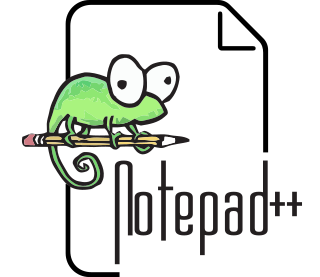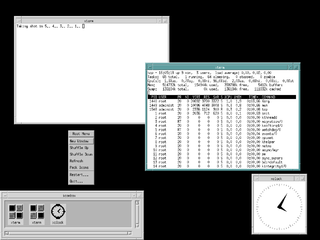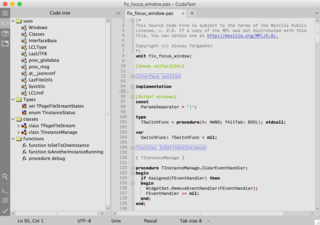
Non-linear editing is a form of offline editing for audio, video, and image editing. In offline editing, the original content is not modified in the course of editing. In non-linear editing, edits are specified and modified by specialized software. A pointer-based playlist, effectively an edit decision list (EDL), for video and audio, or a directed acyclic graph for still images, is used to keep track of edits. Each time the edited audio, video, or image is rendered, played back, or accessed, it is reconstructed from the original source and the specified editing steps. Although this process is more computationally intensive than directly modifying the original content, changing the edits themselves can be almost instantaneous, and it prevents further generation loss as the audio, video, or image is edited.
Object Linking & Embedding (OLE) is a proprietary technology developed by Microsoft that allows embedding and linking to documents and other objects. For developers, it brought OLE Control Extension (OCX), a way to develop and use custom user interface elements. On a technical level, an OLE object is any object that implements the IOleObject interface, possibly along with a wide range of other interfaces, depending on the object's needs.
The resource fork is a fork or section of a file on Apple's classic Mac OS operating system, which was also carried over to the modern macOS for compatibility, used to store structured data along with the unstructured data stored within the data fork.

Inkscape is a free and open-source vector graphics editor for GNU/Linux, Windows and macOS. It offers a rich set of features and is widely used for both artistic and technical illustrations such as cartoons, clip art, logos, typography, diagramming and flowcharting. It uses vector graphics to allow for sharp printouts and renderings at unlimited resolution and is not bound to a fixed number of pixels like raster graphics. Inkscape uses the standardized Scalable Vector Graphics (SVG) file format as its main format, which is supported by many other applications including web browsers. It can import and export various other file formats, including SVG, AI, EPS, PDF, PS and PNG.

ResEdit is a discontinued developer tool application for the Apple Macintosh, used to create and edit resources directly in the Mac's resource fork architecture. It was an alternative to tools such as REdit, and the resource compiler Rez. For the average user, ResEdit was generally easier to use, because it used a graphical user interface. Although it had been intended to be a developer tool, power users often used it to edit icons, menus, and other elements of an application's GUI, customizing it to their own preferences.

UltraEdit is a text editor available for Microsoft Windows, Linux, and macOS. It was initially developed in 1994 by Ian D. Mead, the founder of IDM Computer Solutions Inc., and has been owned by Idera Inc. since August 2021. This editor provides various tools designed for programmers, such as macros, customizable syntax highlighting, code folding, file type conversions, project management, and support for regular expressions in search-and-replace operations. It also offers a column-edit mode, the ability to remotely edit files through FTP, and interfaces for APIs or command lines. UltraEdit allows users to browse and edit multiple files simultaneously using tabs, and it includes support for Unicode and a hex editing mode.

Notepad++ is a free and open-source text and source code editor for use with Microsoft Windows. It supports tabbed editing, which allows working with multiple open files in a single window. The product's name comes from the C postfix increment operator; it is sometimes referred to as npp or NPP.
The Gene Ontology (GO) is a major bioinformatics initiative to unify the representation of gene and gene product attributes across all species. More specifically, the project aims to: 1) maintain and develop its controlled vocabulary of gene and gene product attributes; 2) annotate genes and gene products, and assimilate and disseminate annotation data; and 3) provide tools for easy access to all aspects of the data provided by the project, and to enable functional interpretation of experimental data using the GO, for example via enrichment analysis. GO is part of a larger classification effort, the Open Biomedical Ontologies, being one of the Initial Candidate Members of the OBO Foundry.

Lazarus is a free, cross-platform, integrated development environment (IDE) for rapid application development (RAD) using the Free Pascal compiler. Its goal is to provide an easy-to-use development environment for programmers developing with the Object Pascal language, which is as close as possible to Delphi.
The Extensible Metadata Platform (XMP) is an ISO standard, originally created by Adobe Systems Inc., for the creation, processing and interchange of standardized and custom metadata for digital documents and data sets.

Microsoft Office 2007 is an office suite for Windows, developed and published by Microsoft. It was officially revealed on March 9, 2006 and was the 12th version of Microsoft Office. It was released to manufacturing on November 3, 2006; it was subsequently made available to volume license customers on November 30, 2006, and later to retail on January 30, 2007, shortly after the completion of Windows Vista. The ninth major release of Office for Windows, Office 2007 was preceded by Office 2003 and succeeded by Office 2010. The Mac OS X equivalent, Microsoft Office 2008 for Mac, was released on January 15, 2008.

CKEditor is a WYSIWYG rich text editor which enables writing content directly inside of web pages or online applications. Its core code is written in JavaScript and it is developed by CKSource. CKEditor is available under open source and commercial licenses.
This is a comparison of non-linear video editing software applications. See also a more complete list of video editing software.
The Apple Developer Tools are a suite of software tools from Apple to aid in making software dynamic titles for the macOS and iOS platforms. The developer tools were formerly included on macOS install media, but are now exclusively distributed over the Internet. As of macOS 10.12, Xcode is available as a free download from the Mac App Store.

In computing, the Motif Window Manager (MWM) is an X window manager based on the Motif toolkit.

DMOZ was a multilingual open-content directory of World Wide Web links. The site and community who maintained it were also known as the Open Directory Project (ODP). It was owned by AOL but constructed and maintained by a community of volunteer editors.
The following is a comparison of TeX editors.

BlueGriffon is a WYSIWYG content editor for the World Wide Web. It is based on the discontinued Nvu editor, which in turn is based on the Composer component of the Mozilla Application Suite, which was previously known as Netscape Composer, which was bundled with Netscape Gold before it was renamed to Netscape Communicator. Powered by Gecko, the rendering engine of Firefox, it can edit Web pages in conformance to Web Standards. It runs on Microsoft Windows, macOS and Linux.

CudaText, from Bosnian-Croatian-Montenegrin-Serbian čuda, is a free open source cross-platform native GUI text and source code editor. CudaText supersedes its predecessor SynWrite, no longer under development.











